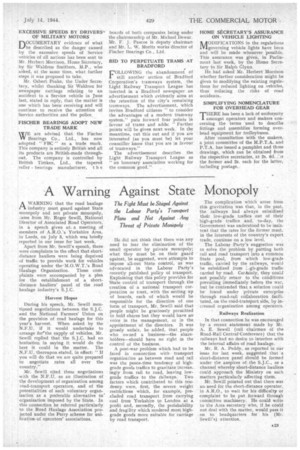A Warning Against State Monopoly
Page 25

If you've noticed an error in this article please click here to report it so we can fix it.
AWARNING that the road haulage industry must guard against State monopoly and not private monopoly, riame from Mr. Roger Sewill, National Director of Associated Road Operators, in a speech given at a meeting of members of A.R.O.'s Yorkshire Area, in Leeds, on July 3, which was briefly reported in our issue for last week.
Apart from Mr. SewilI's speech, there were complaints to the effect that shortdistance hauliers were being deprived of traffic to provide work for vehicles operating under the, M.O.W.T.'s Road Haulage Organization. These complaints were accompanied by a plea foe the establishment of a shortdistance hauliers' panel of the road haulage industry's S.J.C.
Harvest Hopes
During his speech, Mr. Sewill mentioned negotiations between the S.J.C. and the National Farmers' Union on the provision of road haulage for this year's harvest. When asked by the N.F.U. if it would undertake to arrange forsthe supply of vehicles, Mr. Sewill replied -that the S.J.C. had no hesitation in saying it would do the best it could in the matter. The N.F.U. thereupon stated, in effect: " If you will do that we are quite prepared to negotiate rates all over the country."
Mr. Sewill cited these negotiations with the N.F.U. as an illustration of the development of organization among road-transport operators, and of the potentialities of such voluntary organization as a preferable alternative to' organization imposed by the State. In this connection he referred particularly to the Road Haulage Association projected under the Perry scheme for unification-of operators' associations.
He did not think that there was any need to fear the elimination of the small operator by private monopoly: what they must be on their. guard against, he suggested, were attempts to impose all-out State control, as was advocated in the Labour Party's recently published policy of transport. gxplaining that this policy provides for State control of transport through the creation of a national transport corporation or trust, with the setting up of boards, each of which would be responsible for the direction of one form of transport, Mr. Sewill said that people might be graciously permitted to hold shares but they would, have no voice in the management, or in the appointment of the directors. It was grossly unfair, he added, that people who owned a business—the shareholders—should have no right in the control of the business.
A post-war problem which had to be faced in connection with transport organization as between road and rail was the peace-time tendency of highgrade goods traffics to gravitate increasingly from, rail to road, leaving. lowgrade traffics to the railways. Two factors which Contributed to this tendency were, first, the severe weight restrictions which, for example, precluded road transport from carrying coal from Yorkshire to London at a profit and, secondly, the perishability and fragility which rendered most highgrade goods more suitable for carriage by road transport:
The complication which arose from this 'gravitation was that, in the past, the railways had always subsidized their low-grade traffics out of their high-grade traffics and, to-day, the Government was understood to be insistent that the rates for the former must, in the interests of the country's export trade, continue on a low level.
The Labour Party's suggestion was to solve the problem by putting both rail and road transport into a common State pool, from which low-grade traffic, carried by the railways, would be subsidized from i..,gh-grade traffic carried by road. Certainly, they could not possibly retina.. to the conditions prevailing immediately before the war, but he contended that a solution could he found under private enterprise through road-rail collaboration facilitated, on the road-transport side, by increased organization among operators.
Railways Realization In that connection he was encouraged by a recent statement made • by Mr. A. E. Sewell (rail chairman of the Road-Rail Centrar-Conference) that the railways had no desire to interfere with the internal affairs of road haulage.
Mr, R. A. Peddy, as reported in our issue for last week, suggested that a short-distance panel should be formed under the auspices of the S.J.C., as a channel whereby short-distance hauliers could approach the Ministry on such matters particularly affecting them.
Mr. Sewill pointed out that there was no need for the short-distance operator, in A.R.O., to wait for his difficulty or complaint to be put forward through committee inachinery: He could write to the Area secretary who, if he could not deal with the matter, would pass it on to headquarters for his (Mr. Sewill's) attention.




















































